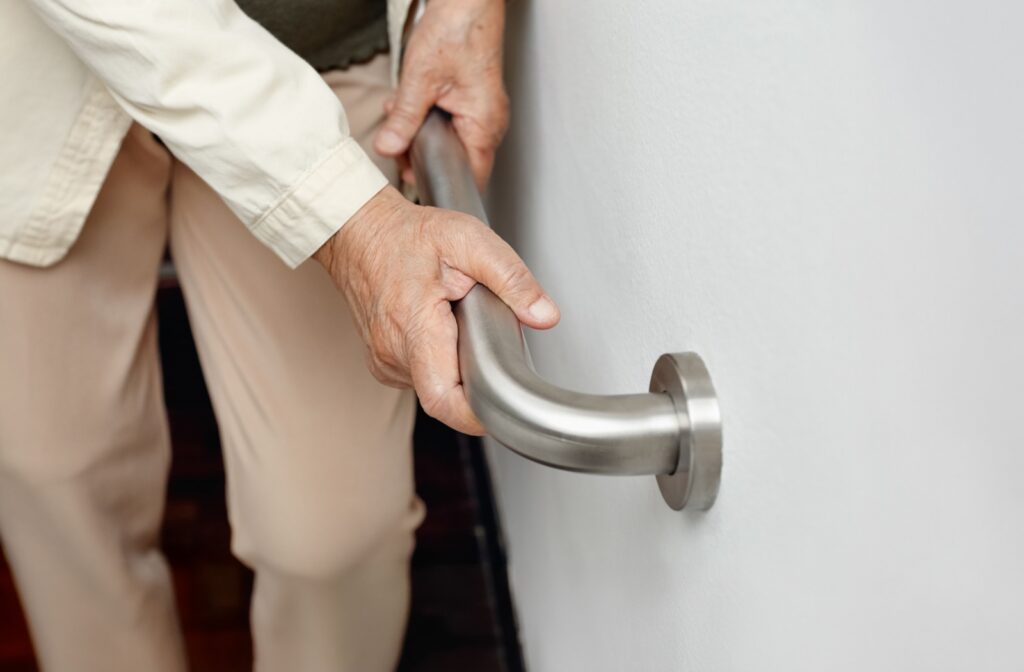Caring for an elderly parent is a journey filled with love, dedication, and sometimes unexpected challenges. One such challenge is navigating the complexities of your elderly parent no longer being able to walk.
Knowing what to do when your elderly parent loses the ability to walk can be an overwhelming situation. Fortunately, with the right approach and resources—including assessing the situation, exploring mobility aids, considering home modifications, and seeking professional help and emotional support when needed—you can make sure they receive the care and support they need while maintaining their dignity and quality of life.
Inspired Living at Lakewood Ranch is here to help you and your loved ones by providing resident accommodations equipped for all levels of mobility, as well as respite care for those who choose to age in place but need a temporary break from home.
Assessing the Situation
The first step is to comprehensively assess the situation. Understanding the underlying reasons for your parent’s mobility issues is important. They could be due to a medical condition, an injury, or the natural progression of age-related factors.
Consult with healthcare professionals to diagnose the root cause and develop a tailored care plan. This may involve a thorough examination by a geriatric specialist, a physiotherapist, or a neurologist in order to provide an accurate assessment.
During this phase, consider conducting a functional assessment of your parent’s daily activities. Identify which tasks they can still perform independently and which require assistance. This evaluation helps in determining the level of care needed and whether interventions like physical therapy might help improve mobility or strength.
Exploring Mobility Aids
Mobility aids play an essential role in enhancing the quality of life for those who struggle with walking. Wheelchairs, walkers, and scooters are some of the options available to provide freedom and independence. Choosing the right mobility aid depends on your parent’s specific needs and physical condition.
Consult with a physical therapist or mobility specialist who can recommend the most suitable aid and assist with proper fitting and usage.
It’s also important to make sure that your parent is comfortable using these aids. Encourage practice sessions in a safe environment to build confidence. Regular maintenance checks of these devices are necessary to ensure safety and functionality.

Considering Home Modifications
Creating a safe and accessible living environment is important when your elderly parent can no longer walk. Home modifications can significantly enhance their ability to navigate their surroundings safely. Key areas for modification include the bathroom, kitchen, and general living spaces, each requiring specific adjustments to reduce fall risks and enhance accessibility.
In the bathroom, modifications like installing walk-in showers, grab bars, elevated toilet seats, and non-skid mats can significantly reduce fall hazards. Kitchens can be adapted with features like C or D-shaped drawer handles, varied countertop heights, and temperature-controlled cookware to enhance safety and usability.
General home modifications include adding night lights, widening doorways, and replacing traditional door knobs and light switches with more accessible options. For older adults with Alzheimer’s, additional measures like door chimes and child locks can prevent wandering and ensure safety.
Consulting with an occupational therapist can provide insights into necessary adaptations that promote safety and independence.
Seeking Professional Help
Professional support is invaluable in managing the care of a non-ambulatory parent. Engaging home care services can offer assistance with daily activities such as bathing, dressing, and meal preparation. These services are tailored to your parent’s specific needs and can range from a few hours a week to round-the-clock care.
If home care is not sufficient, exploring assisted living or nursing home options might be necessary. Inspired Living at Lakewood Ranch and similar communities provide comprehensive care tailored to individuals with limited mobility while making sure of a supportive community environment.
Emotional Support for the Parent & Family
Emotional well-being is as important as physical health, especially in challenging times. Loss of mobility can lead to feelings of frustration, depression, and helplessness for your loved one. It’s important to provide emotional support, helping them cope with these changes. Encourage open communication and active participation in decision-making processes regarding their care. This involvement can enhance their sense of autonomy and control over their life.
Family members also need support, as caregiving can be emotionally taxing. Seek out support groups or counseling services to share experiences and gather strength from others facing similar challenges. Taking time for self-care is crucial; remember that caring for yourself enables you to provide better care for your loved one.
Guiding Your Loved One With Compassion & Care
When an elderly parent can no longer walk, this presents a complex set of challenges. Yet, with a thoughtful approach encompassing assessment, mobility aids, home modifications, professional help, and emotional support, you can navigate this journey with compassion and efficacy.
At Inspired Living at Lakewood Ranch, we understand the importance of creating a supportive environment for both residents and their families. Together, we can make sure that your loved one continues to live a fulfilling, dignified life.
Take the first step towards your loved one receiving the compassionate care they deserve. Explore the comprehensive services and supportive community at Inspired Living at Lakewood Ranch, where maintaining dignity and quality of life is our priority. Get in touch with us today to learn how we can help you navigate this journey with confidence and peace of mind.









